Posted — Filed under
V-Day
Tagged — No Comments
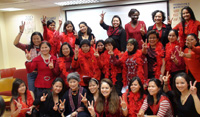 Twelve years ago, V-Day had the great fortune to meet an incredible, inspirational, and truly courageous woman by the name of Monique Wilson. She was the first to bring V-Day events to the Philippines and over the years she has organized performances in local theaters, the Philippine Senate and House of Congress, War Crimes Tribunals, packed stadiums, universities, and international conferences. Through her passion and influence, countless women and girls have been given a voice and have been empowered to become leaders within their communities to raise awareness about violence against women and girls.
Twelve years ago, V-Day had the great fortune to meet an incredible, inspirational, and truly courageous woman by the name of Monique Wilson. She was the first to bring V-Day events to the Philippines and over the years she has organized performances in local theaters, the Philippine Senate and House of Congress, War Crimes Tribunals, packed stadiums, universities, and international conferences. Through her passion and influence, countless women and girls have been given a voice and have been empowered to become leaders within their communities to raise awareness about violence against women and girls.
This year alone, Monique has organized over nine V-Day events including upcoming performances in Manila, and most recently she directed an incredible benefit production of The Vagina Monologues with thirty-five members of Justice For Domestic Workers (JD4W) in London. Monique has shared with us her her experience with the incredible women of JD4W, we ask you to please read her piece, V-Day With Justice for Domestic Workers, and join us in celebrating the incredible work of Monique Wilson.
READ V-Day With Justice for Domestic Workers by Monique Wilson >
Posted — Filed under
V-Day
Tagged — No Comments
Brussels, March 21, 2012 – On 6 March, nine women MEPs took the stage at the European Parliament and performed The Vagina Monologues as a call to action to end violence against women (http://www.vday.org/node/2866). Something shifted. Energy was set free. Violence against women was no longer an issue that could be ignored.
Around a week later, it became known that a group of some younger MEPs had invited Dominique Strauss Kahn, along with the Prime Minister of Luxembourg and the former President of the European Central Bank, to a debate on “lessons learned from the global economic crisis”, hosted at the European Parliament on March 27, one day before French prosecutors are to decide if they will press charges against DSK for pimping and misuse of company funds.
Many MEPs, both male and female, expressed their outrage and concern about this invitation to the President of the European Parliament (http://EUobserver.com/18/115647 ; http://www.dhnet.be/infos/monde/article/388739/dsk-a-bruxelles-le-27mars…), as civil society groups in Brussels started mobilizing.
Last night, the MEP organizing the event tweeted that DSK announced that he has to decline coming to the event on March 27.
Read this article (in French) for an account of the developments from V-Day EP to the cancellation of DSK’s visit to the EP:
http://blogs.rtl.be/carnetpolitique/dsk-a-un-empechement-il-ny-aura-pas-…
Posted — Filed under
V-Day
Tagged — No Comments
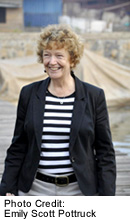 This past weekend we lost a visionary, a fighter for women’s rights, and a “mama” to so many women and girl survivors of sexual violence in Congo. On March 17th, co-founder and Program Director of HEAL Africa Lyn Lusi passed away from terminal cancer. Lyn dedicated her life to the women and girls of Congo. According to HEAL Africa’s website, she first arrived in 1971 and worked in school and hospital administration in northeastern Congo (Nyankunde) for 19 years. In 2000 Lyn and her husband Dr. Kasereka (“Jo”) Lusi, founded HEAL Africa, a Congolese-led organization in the Democratic Republic of the Congo, working to eradicate poor health, poverty and the oppression of women. HEAL Africa has performed more than 1,500 post-rape fistula repair surgeries, provided primary care and counseling to more than 40,000 women, established 31 Safe Houses, trained 90,000 community activists in HIV/AIDS prevention and care, and funded more than 1,500 micro grants for families.
This past weekend we lost a visionary, a fighter for women’s rights, and a “mama” to so many women and girl survivors of sexual violence in Congo. On March 17th, co-founder and Program Director of HEAL Africa Lyn Lusi passed away from terminal cancer. Lyn dedicated her life to the women and girls of Congo. According to HEAL Africa’s website, she first arrived in 1971 and worked in school and hospital administration in northeastern Congo (Nyankunde) for 19 years. In 2000 Lyn and her husband Dr. Kasereka (“Jo”) Lusi, founded HEAL Africa, a Congolese-led organization in the Democratic Republic of the Congo, working to eradicate poor health, poverty and the oppression of women. HEAL Africa has performed more than 1,500 post-rape fistula repair surgeries, provided primary care and counseling to more than 40,000 women, established 31 Safe Houses, trained 90,000 community activists in HIV/AIDS prevention and care, and funded more than 1,500 micro grants for families.
V-Day has worked closely with Lyn and HEAL Africa since 2007, and though our hearts are heavy, Lyn will continue to inspire us daily.
Eve wrote this tribute to Lyn upon hearing the sad news of her passing –
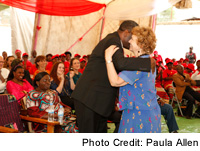 Lyn Lusi died last night. She was the founding director of Heal Africa in Goma. She healed thousands of lives, saved and lifted thousands of others. She was safety. She was home. She was possibility. I want to write about her heart. I want to write about her devotion to the women and the girls and healthcare and education and stopping AIDS. I want to write about her consistency and tenacity, about her kindness and her roses. She planted
Lyn Lusi died last night. She was the founding director of Heal Africa in Goma. She healed thousands of lives, saved and lifted thousands of others. She was safety. She was home. She was possibility. I want to write about her heart. I want to write about her devotion to the women and the girls and healthcare and education and stopping AIDS. I want to write about her consistency and tenacity, about her kindness and her roses. She planted 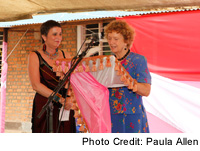 gardens. There are blossoms all over the DRC. I want to write about dancing with Lyn in Goma and sitting with her at fancy fundraisers in London and cheering with her just this January for the women graduates from Heal Africa at City of Joy in Bukavu. I want to talk about her being a teacher of service and a mentor of listening and a mother of compassion. Lyn was what care looks like and devotion and finding a way through and absorbing pain and turning it to magic and power. I want to write about Lyn’s love for Congo and all the ways she manifested that love. She literally gave her being and body. No one will ever replace her. They couldn’t. What we can do in her name, in her legacy is open our hearts further, listen deeper, serve more gently and fight more fiercely for what she loved, the women, the Congo. We can devote ourselves in her name to the time, may it be soon, when the Congolese rise to take their country, their minerals, their rights, their bodies, their future born from a soil that her love made rich. I loved Lyn. She was my friend and my sister. I will miss her deeply.
gardens. There are blossoms all over the DRC. I want to write about dancing with Lyn in Goma and sitting with her at fancy fundraisers in London and cheering with her just this January for the women graduates from Heal Africa at City of Joy in Bukavu. I want to talk about her being a teacher of service and a mentor of listening and a mother of compassion. Lyn was what care looks like and devotion and finding a way through and absorbing pain and turning it to magic and power. I want to write about Lyn’s love for Congo and all the ways she manifested that love. She literally gave her being and body. No one will ever replace her. They couldn’t. What we can do in her name, in her legacy is open our hearts further, listen deeper, serve more gently and fight more fiercely for what she loved, the women, the Congo. We can devote ourselves in her name to the time, may it be soon, when the Congolese rise to take their country, their minerals, their rights, their bodies, their future born from a soil that her love made rich. I loved Lyn. She was my friend and my sister. I will miss her deeply.

LEARN more about HEAL Africa >
Posted — Filed under
V-Day
Tagged — No Comments
On March 18th, thirty-five members of Justice For Domestic Workers (JD4W) performed in a special community V-Day benefit production of The Vagina Monologues. V-Day activist and organizer Monique Wilson directed the show, and ran a series of five weekly full day Sunday V-Day workshops in preparation for the performance.
The workshops consisted of theatre games and exercises to build confidence and communication skills, then lead into creative empowerment sessions where women were encouraged to share their personal stories from their individual cultures and experiences with their employers, and engage in discussions where they could envision a world with no violence in which the women could see themselves as leaders in their communities. The theatre workshops formed the basis of the workshops to begin with, as English is not the first language for most of the domestic workers. Five weeks later they were now ready to perform The Vagina Monologues.
“For most not being able to read in English – to now doing the play – is amazing and incredible. Doing V-Day is empowering them so profoundly. I don’t have enough words to describe their journey, and our journey with them. It is so emotional, and so life-changing.” Monique Wilson
V-Day Justice for Domestic Workers, a special performance of The Vagina Monologues was performed on March 18th, 3 – 5pm at the Faraday House (Syracuse University London Programme), 48 – 51 Old Gloucester Street, London, WC1N 3AE. It is supported by UNITE, the biggest labor union in the UK.
JD4W is an organization of domestic workers who work in private houses in the UK as nannies, cooks and maids, most of whom have had to escape abusive employers. The migrant domestic workers are women from the Philippines, Sri Lanka, Indonesia, Thailand, Nepal, Nigeria, Morocco, Brazil, India and Pakistan. Community organizing is central to what the organization does, and it is run for and by domestic workers. They believe that to secure their rights they must educate and mobilize themselves and build links to those who can support them. For more information visit www.j4dw.org or email: info2@j4dw.org
Posted — Filed under
V-Day
Tagged — No Comments
Rosario Dawson’s acting break came when she was just 15, in Larry Clark’s troubling film Kids. She’s built a thriving career since, but it’s her work as a political activist that sets her apart
Rosario Dawson is not like other Hollywood actors. Consider this: she’s 32, and in her 20s decided she’d had enough of being judged on her looks, so took to wearing enormous sweatshirts to auditions.
“I’d perform my ass off, and the casting directors would be like, ‘You are perfect for this role, but can you wear something a little less shapeless?'” Her manager would bargain with her. She could wear a roll-neck jumper, he said – but could it at least be a fitted one? “I’m like, ‘Ugh, fine’, but these stupid conversations needed to be had, because unfortunately, don’t believe what they tell you, there’s very little imagination in Hollywood.” She hoots with laughter.
It annoyed her when casting directors asked to see her in more revealing clothes, she says, because she was naked in the film Alexander, “so go to any crazy, sick website and you’ll be able to look at it in slow motion if you like”. Does that bother her? “No, not at all, my point being: then don’t complain, ‘We don’t know what she really looks like.’ Are you kidding?! Do your research. ‘She looks a little fat right now’,” she says, recalling a message that filtered down from some rotten, deluded film executive. “Really? They’re called breasts … There was definitely a period for a couple of years where I rebelled against it. It probably cost me a lot of really big jobs, but I was just so angry.”
I had been worried Dawson would be too tired to talk properly. Earlier in the day, she had called to put the interview back two hours, pleading jetlag, her voice full of mid-Atlantic grogginess. But she arrives at the Guardian on foot, poses quickly for a photo, sits down and she’s away, words tumbling out.
She’s been a women’s activist for years, and I realise how steeped she is in feminist argument when she talks about how public-sector cuts are affecting women in the UK. (Dawson has a flat in London, but this still takes me aback.) She’s active in all sorts of ways – she’s a long-time volunteer with a girls’ club where she grew up in Manhattan, and appears in the feminist documentary Miss Representation. Later this month she’s performing in A Memory, a Monologue, a Rant and a Prayer, a benefit in London for the organisations V-Day and Women for Women International. The event is based on writings about violence against women, edited by playwright, activist and close friend, Eve Ensler.
The piece Dawson is performing is radical. Written by Periel Aschenbrand, In Memory of Imette starts with the narrator being terrified by the murder of a female student near her apartment. She arms herself with weapons including “a big-ass hunting knife,” Aschenbrand writes, “with which, if need be, I could slice off someone’s testicles”. I ask how Dawson feels about performing the monologue, and she says she completely agrees with its central message, that men and women need to talk more about rape. “You know, don’t just walk down the street and be like everything’s peaches and roses. It’s one in three women who are going to be raped, killed, beaten or abused in her lifetime, and that’s just real. To not live with that as a reality is really dangerous for women, and it lets a lot of guys off the hook from really paying attention to what’s happening to the women around them. Because it’s not all the men who are doing it, but not every single guy that boasts in the locker-room about the hot sex he had last night, had it with someone who was conscious.”
It’s not the first time Dawson has addressed the subject of rape head-on. She produced the 2007 film Descent, written and directed by her friend Talia Lugacy, and starred as Maya, a student who is raped by a classmate. The character goes on to exact revenge, in one of the more extreme scenes in modern, mainstream film-making, but the story is also thoughtful. It shows the slow arc of Maya’s brutalisation, and her feelings after striking back, too.
Being a producer on the film provided some useful distance, she says.
“Otherwise I could have disappeared into that character more, you know, and it would have taken me down. It was really depressing … But I thought it was important to show and really talk about revenge, and to put that question into people’s minds. People have all these ideas about it, but what it would actually look like is not a triumph. It’s actually really degrading and sad.” After the film came out, Ensler invited her to sit on the board of V-Day, a movement to end violence against women. “I remember exactly where I was when she asked,” she says, “and I was so excited.”
Dawson’s career has taken her through gritty dramas (He Got Game), broad teen comedies (Josie and the Pussycats), musicals (Rent), very broad adult comedies (Clerks II) and children’s films (Zookeeper). It includes the comic book fantasy, Sin City – a project that reflects her lifelong love of comics. (In 2006, she co-created her own comic series, Occult Crimes Taskforce.)
She started out playing Ruby in Larry Clark’s 1995 film Kids, aged 15. Written by Harmony Korine, Kids is a tough, troubling film, opening with a scene of child sex and moving through drugs, theft, extreme violence, racism, rape and brutal conversations about men having sex with disabled women. In its midst, Dawson seemed one of the few mild beacons of hope. Her character was tough, too, laughing and joking about the difference between sex, making love and fucking (she preferred the last), but there was something essentially redemptive about her.
Although she’s very different to that character, she understood her circumstances, having grown up on New York’s Lower East Side herself.
Her mother was 17 when Dawson was born, and only found out she was pregnant when she was picked for the 1980 Olympic volleyball team and had to take a test. (The US Olympics team boycotted that year for political reasons, so it didn’t affect her participation.)
Dawson’s biological father was not around, but when her mother was eight months’ pregnant she started seeing a man she’d known for years, who went on to adopt her daughter. “I think about that now,” says Dawson, “such a young man, marrying a woman with a baby who’s not his – that just doesn’t happen. He just loved my Mom, and he loved me, and I loved my Dad, you know?”
She’s never met her biological father. “I tried looking him up online, and 70-something names showed up, some of them only with addresses, and I thought: I’m not going to do that … Maybe if I have a child, I’ll want to know, just for medical history reasons.” She was “violently afraid” of becoming a teenage mother herself, aware of how it had limited her mother’s options, but the experience of being adopted has made her keen to follow that lead – ideally to adopt an older child, who’s otherwise unlikely to find a home.
When she was growing up, Dawson’s father worked in construction, and her mother did a variety of jobs – electrician, plumber, typist – but the family faced financial straits. They lived, initially, “in this slumlord apartment, with rats, tilted floors, a bath tub in the kitchen”. There was a farmers’ market nearby and her mother “used to get food out of the bins. It was fresh food, but technically speaking, she was bin-diving. We still ate and we were eating organic,” she gives a wry smile. “But that’s a pretty tough thing as a Mom to have to do.”
They moved into a squat when she was six and her brother Clay was one. “A place with a huge, gaping hole in the ground and plastic for windows. I saw the stress on my parents. We were the only children in the building for years, because no one else was that crazy. But we had a wonderful childhood because of it. Everybody who moved in had different apartments, and it wasn’t until the sewage lines and the electricity went in that everybody disappeared behind their doors. People really needed each other beforehand.”
Her mother was always an activist; when Dawson was 10, her mother volunteered at a crisis centre where women who had been “beaten and abused, probably for years, showed up with children and the T-shirt on their back”. She would help her mother at Housing Works, an organisation providing housing for families and homeless people living with HIV/AIDS. “One person had been living like a hermit and didn’t have any family, any friends, and died. So here we were cleaning it out, and trying to make it nice and new again, so we could bring in someone else. It was heavy work.”
Her parents and other squat residents built a stoop to keep away drug dealers, and it was hanging out there one day that she was discovered by Clark and Korine. “This guy was like, ‘You just look so perfect.’ And I thought, ‘what are you talking about?’ Harmony was hopping up and down, he was 19, and Larry can come off a little lasciviously, so I was like, ‘Um, Daddy, there are random people here who have asked me to be in a movie.'”
Her father rode her to the audition on the crossbar of his bicycle. “I remember thinking, ‘Oh, this looks legitimate.’ It was a big office. I had to read, and Larry said, ‘Is that your boyfriend outside?’ And I was like, ‘Ew, that’s my Dad! What is wrong with you?'”
The family went on holiday to Texas with the money she made, and ended up living there. Dawson wasn’t completely sold on acting then. She’d always loved maths, and started to love biology. But she ended up moving back to Manhattan, and attending the Lee Strasberg Theatre and Film Institute.
Dawson has a mixed heritage – Puerto Rican, Afro-Cuban, Irish and Native American – and says this has been an unexpected asset. “I remember having a conversation with an actress who was blonde and blue-eyed, and she was like, ‘You’re going to do really well here [Hollywood].’ And I was still really struggling, and said, ‘O-K.’ And she said, ‘no, Rosario, there are a million girls who show up in Hollywood every day who look like me. There’s not a lot of people who look like you.”
Spending time with Dawson is uplifting. Her political discussion flows from Voto Latino, the organisation she co-founded in 2004 to encourage Latino people to vote; her passionate support for One Billion Rising, Ensler’s upcoming march to end violence against women; ecological campaigns; a call for an end to lobbying in Washington. She has been shooting Trance, an art-heist film directed by Danny Boyle, and is rapturously excited to be playing US labour rights activist, Dolores Huerta, in a film directed by Diego Luna.
And she talks with just as much effusive energy about the women’s benefit. “I love this piece,” she says, “because it’s really in your face, and sometimes you’ve got to make people a little uncomfortable.
“There are horror movies that are made, but those are fake horrors – there are plenty of real things to be scared about, and to want to do something about. I’m just grateful,” she says, like a true comic-book enthusiast, “to be able to use my powers for good, not evil”.
Rosario Dawson performs A Memory, A Monologue, A Rant and A Prayer at the Lyric Theatre, London, on 26 March 2012. All proceeds go to V-Day and Women for Women International. Details: nimaxtheatres.com or 0844 482 9674.
Posted — Filed under
V-Day
Tagged — No Comments
http://www.asiaone.com/News/AsiaOne+News/Asia/Story/A1Story20120309-3324…
By Lee Woo-young
The Korea Herald/Asia News Network
Friday, Mar 09, 2012
SEOUL – A group of Korean women who were forced into sexual slavery during World War II pledged on Thursday to help Congolese women suffering because of sexual abuse and rape, if they receive financial compensation from Japan for its wartime atrocities against them.
“I decided to help those who were treated much worse than me. If I get the compensation, I hope the people helping me fight for compensation as well as an apology from Tokyo will send it to the Congolese women,” said Kim Bok-dong at a press conference at the office of the Korea Council for the Women Drafted for Military Sexual Slavery by Japan in Seoul.
Gil Won-ok, another victim of sexual slavery, said: “If the Japanese ever compensate us, I hope it will become an essential help to those young women.”
Thousands of women have fallen victim to sexual abuse and rape by militias during the past two decades of regional conflict in the Democratic Republic of Congo.
The UN estimates more than 8,000 women were subject to sexual violence in 2009.
But as chances are slim the Japanese government will offer an apology and compensation to the “comfort women,” the KCDW plans to create a fund and deliver the collected amount to the Congolese female activist Rebecca Masika Katsuva, who has advocated for the rights of rape victims.
The Japanese government argues the comfort women issue was settled by a bilateral pact in 1965 to settle financial reparations for Japan’s colonization of Korea from 1910-45, while Seoul maintains that the issue is a separate humanitarian issue that was not covered under it.
“The ladies have broadened their thinking when the Japanese government has been narrow-minded over the issue. We hope their good will can be spread to the international community and deliver hope to the Congolese women,” said Yoon Mee-hyang, head of the KCDW.
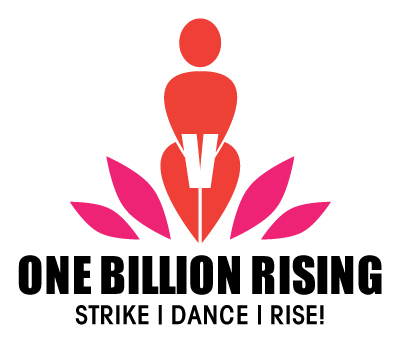 V-Day is pleased to announce the launch of our ONE BILLION RISING Tumblr! Featuring all the latest news from the campaign, live Twitter and Facebook feeds, and easy access to sign up, onebillionrising.org is your gateway to the worldwide ONE BILLION RISING community.
V-Day is pleased to announce the launch of our ONE BILLION RISING Tumblr! Featuring all the latest news from the campaign, live Twitter and Facebook feeds, and easy access to sign up, onebillionrising.org is your gateway to the worldwide ONE BILLION RISING community. Twelve years ago, V-Day had the great fortune to meet an incredible, inspirational, and truly courageous woman by the name of Monique Wilson. She was the first to bring V-Day events to the Philippines and over the years she has organized performances in local theaters, the Philippine Senate and House of Congress, War Crimes Tribunals, packed stadiums, universities, and international conferences. Through her passion and influence, countless women and girls have been given a voice and have been empowered to become leaders within their communities to raise awareness about violence against women and girls.
Twelve years ago, V-Day had the great fortune to meet an incredible, inspirational, and truly courageous woman by the name of Monique Wilson. She was the first to bring V-Day events to the Philippines and over the years she has organized performances in local theaters, the Philippine Senate and House of Congress, War Crimes Tribunals, packed stadiums, universities, and international conferences. Through her passion and influence, countless women and girls have been given a voice and have been empowered to become leaders within their communities to raise awareness about violence against women and girls.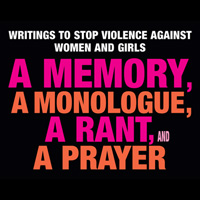 Join Eve, V-Day Board members Rosario Dawson and Thandie Newton, and a cast including Trudie Styler, Neneh Cherry, Meera Syal and more for a special one-night V-Day benefit performance of A Memory, A Monologue, A Rant, and A Prayer at the Lyric Theatre in London. Prices from – £21 to £96. 100% of the proceeds will go towards ending violence against women and girls. Every ticket sale is being matched by Goldman Sachs Gives and tripled by the Millby Trust.
Join Eve, V-Day Board members Rosario Dawson and Thandie Newton, and a cast including Trudie Styler, Neneh Cherry, Meera Syal and more for a special one-night V-Day benefit performance of A Memory, A Monologue, A Rant, and A Prayer at the Lyric Theatre in London. Prices from – £21 to £96. 100% of the proceeds will go towards ending violence against women and girls. Every ticket sale is being matched by Goldman Sachs Gives and tripled by the Millby Trust. This past weekend we lost a visionary, a fighter for women’s rights, and a “mama” to so many women and girl survivors of sexual violence in Congo. On March 17th, co-founder and Program Director of
This past weekend we lost a visionary, a fighter for women’s rights, and a “mama” to so many women and girl survivors of sexual violence in Congo. On March 17th, co-founder and Program Director of  Lyn Lusi died last night. She was the founding director of Heal Africa in Goma. She healed thousands of lives, saved and lifted thousands of others. She was safety. She was home. She was possibility. I want to write about her heart. I want to write about her devotion to the women and the girls and healthcare and education and stopping AIDS. I want to write about her consistency and tenacity, about her kindness and her roses. She planted
Lyn Lusi died last night. She was the founding director of Heal Africa in Goma. She healed thousands of lives, saved and lifted thousands of others. She was safety. She was home. She was possibility. I want to write about her heart. I want to write about her devotion to the women and the girls and healthcare and education and stopping AIDS. I want to write about her consistency and tenacity, about her kindness and her roses. She planted  gardens. There are blossoms all over the DRC. I want to write about dancing with Lyn in Goma and sitting with her at fancy fundraisers in London and cheering with her just this January for the women graduates from Heal Africa at City of Joy in Bukavu. I want to talk about her being a teacher of service and a mentor of listening and a mother of compassion. Lyn was what care looks like and devotion and finding a way through and absorbing pain and turning it to magic and power. I want to write about Lyn’s love for Congo and all the ways she manifested that love. She literally gave her being and body. No one will ever replace her. They couldn’t. What we can do in her name, in her legacy is open our hearts further, listen deeper, serve more gently and fight more fiercely for what she loved, the women, the Congo. We can devote ourselves in her name to the time, may it be soon, when the Congolese rise to take their country, their minerals, their rights, their bodies, their future born from a soil that her love made rich. I loved Lyn. She was my friend and my sister. I will miss her deeply.
gardens. There are blossoms all over the DRC. I want to write about dancing with Lyn in Goma and sitting with her at fancy fundraisers in London and cheering with her just this January for the women graduates from Heal Africa at City of Joy in Bukavu. I want to talk about her being a teacher of service and a mentor of listening and a mother of compassion. Lyn was what care looks like and devotion and finding a way through and absorbing pain and turning it to magic and power. I want to write about Lyn’s love for Congo and all the ways she manifested that love. She literally gave her being and body. No one will ever replace her. They couldn’t. What we can do in her name, in her legacy is open our hearts further, listen deeper, serve more gently and fight more fiercely for what she loved, the women, the Congo. We can devote ourselves in her name to the time, may it be soon, when the Congolese rise to take their country, their minerals, their rights, their bodies, their future born from a soil that her love made rich. I loved Lyn. She was my friend and my sister. I will miss her deeply.